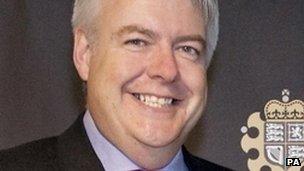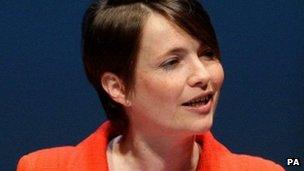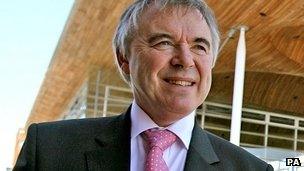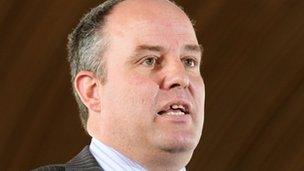The Welsh government's budget: who wins, who loses?
- Published
The deal over the Welsh government's finances is done.
The budget was formally passed in the Senedd on Tuesday, with Liberal Democrats supporting the Labour administration.
And so, after weeks of negotiating between politicians, who are the winners and losers?
And are they just in Cardiff Bay, or across Wales as a whole?
LABOUR

Welsh Labour leader: First Minister Carwyn Jones
The deal allows First Minister Carwyn Jones to claim he has stuck to his promise to act without tribalism.
He spoke to Plaid Cymru. He spoke to the Liberal Democrats. He even spoke to arch rivals the Conservatives, although admittedly not for very long.
The deal with the Lib Dems will help Labour pass its first big test of governing without a majority of seats in the Senedd.
Mr Jones will need to scrap and plead for every vote he can find on the opposition benches between now and the next election in 2016.
A successful vote on his first budget is a good start.
And it comes at a good price. The £20m which secured Lib Dem support - 0.14% of the total budget - does not require cuts to any other budget line.
Who would argue against giving a leg-up to school children from poor families? Certainly not Labour.
LIBERAL DEMOCRATS

Welsh Liberal Democrat leader Kirsty Williams
In Westminster they are in coalition with the Conservatives. In Cardiff they are cutting deals with Labour.
Lib Dems in Wales can say their party is willing to talk to rivals in search of stability during uncertain times.
Any Lib Dems who are uneasy about the UK coalition government will welcome some breathing space between them and the Tories.
Welsh Lib Dem leader Kirsty Williams said she had secured a key policy from her party's assembly election campaign with just five AMs.
She added, pointedly: how many policies have Tory assembly leader Andrew RT Davies and his 13 colleagues delivered?
There is no love lost between those two.
Meanwhile, Mrs Williams keeps her options open, saying this is a one-off vote, not an embryonic coalition with Labour.
It will be a useful boon to the party as it gears up to protect its crucial local government base at council elections next May.
PLAID CYMRU

Plaid Cymru leader Ieuan Wyn Jones
Plaid Cymru thinks it has touched a nerve with its claim that Labour has sat back since being re-elected in May.
Failure to act on the economy is the reason Plaid gives for withholding its support for Labour's spending plans.
That is even though the budget is almost the same as the one passed by the two parties in January when they were in coalition together.
Changes from this year to next account for less than 1% of overall spending, according to Finance Minister Jane Hutt.
But Plaid leader Ieuan Wyn Jones says the economy has slid since that last coalition budget was agreed.
Mr Jones, the former economy minister, shows no sign of tiring of his jibe that this is a lacklustre government which has failed to respond to a deteriorating economy.
Plaid will go on making the argument after the budget is voted through. But surely it would rather be in a position where it could point to a deal with Labour that finds extra money for the economy?
CONSERVATIVES

Welsh Conservative leader Andrew RT Davies
Talks between the Conservatives and Labour over the budget were courteous, but brief.
There was never really a prospect of Welsh government ministers seriously negotiating with the Tories.
And it is in the interests of Welsh Conservatives that they have as much ammunition as possible to fire at Labour.
The barb of choice for the Tories is that Labour is cutting health spending.
To be clear, the amount of cash going to the NHS is growing. But by failing to keep pace with inflation the Tories say it will force cuts.
Labour's reply has been - and will continue to be - if you want more money for the NHS tell us where to find it.
The Welsh government is facing unprecedented cuts to its funding from the Treasury.
Against that backdrop, Labour says it is doing the best it can. Both sides seem happy to keep slogging this one out.
SCHOOLS

Labour agreed with Lib Dems on more school money
The extra spending that clinched the deal with the Lib Dems is only a small part of the government's overall budget.
But the help it will provide schools is not to be sniffed at during a public spending squeeze.
The extra £20m swells the government's pupil deprivation grant - dubbed a pupil premium by the Lib Dems - to more than £32m next year.
The money will be shared between the more than 70,000 children who receive free school meals.
Schools will get an extra £450 for every child entitled to free dinners.
The teaching union ATL Cymru says it will help close a funding gap between schools in England and Wales.
- Published26 November 2011